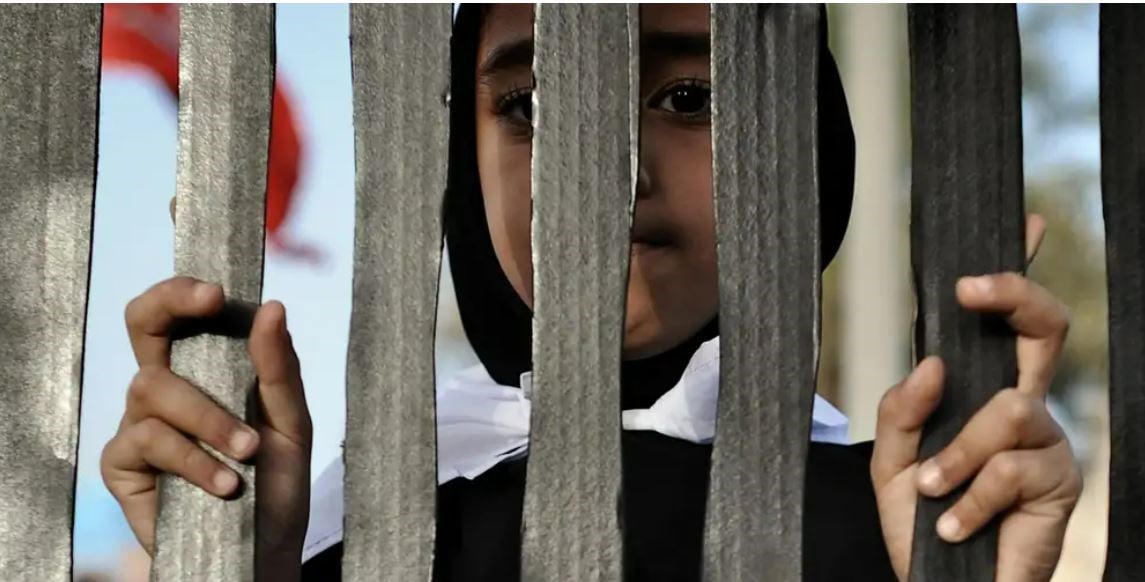Bahraini political prisoners continue their hunger strike
Bahraini political prisoners have snatched some of their basic rights as they carry on a widespread hunger strike in protest of the systemic oppression they face in authorities' prisons.
-

A Bahraini woman during an anti-government rally in solidarity with jailed political prisoners in the village of A’ali, 27 June 2013. (AFP via Getty Images)
Bahraini authorities have reportedly agreed to grant political prisoners basic rights, including extended visiting hours, a move that comes as a result of one of the largest hunger strikes in the country's history which was initiated on August 7.
The Bahraini Interior Ministry announced its decision to prolong visitation periods and explore increased outdoor time for inmates, specifically at the Jau prison where the hunger strike commenced in early August.
Despite these developments, the strike, which has involved around 800 political prisoners, many of whom are dissidents detained during a 2011 crackdown on the opposition's protests, continues.
The Bahrain Institute for Rights and Democracy (BIRD) has criticized the authorities for their belated response, asserting that the hunger strike will persist until the government addresses prisoners' concerns genuinely and earnestly.
This protest has spurred unusual street demonstrations from the families of inmates, demanding their prompt release. The head of Bahrain's National Institution for Human Rights has engaged with the prisoners to hear their grievances.
The strikers are advocating for improved medical attention, access to education, and the ability to pray together at a prison mosque.
The situation has prompted calls for international support from human rights organizations like Human Rights Watch, particularly given the case of 62-year-old Bahraini-Danish human rights defender Abdulhadi Al-Khawaja, who joined the hunger strike and was subsequently hospitalized.
This incident underscores broader issues surrounding Bahrain's treatment of dissidents and its relationship with the international community, given its strategic alliance with the United States and hosting of the US Navy's Fifth Fleet.
Fading Lives: The silent tragedy of political detainees
Bahrain, a small nation in the Gulf region with a population of 1.5 million, stands out for having one of the highest rates of incarceration per capita in the Middle East.
Currently, approximately 3,800 individuals are imprisoned, and around 1,200 of them are categorized as prisoners of conscience, as estimated by Bird.
The backdrop for this situation dates back to the 2011 pro-democracy protests against the ruling Al Khalifa family, leading to the detention of a considerable number of individuals associated with these demonstrations.
The government's response has been marked by extensive crackdowns on activists, members of civil society, and opposition political groups, with the added measure of banning two political parties.
A significant portion of these political detainees, totaling 1,200, find themselves confined within the notorious Jau prison. Former inmates have recounted that these detainees are isolated in distinct sections and subjected to particularly harsh treatment.
Prominent figures in the political sphere, such as human rights advocate Abdulhadi Al-Khawaja, are among those partaking in the hunger strike within Jau prison. Maryam Al-Khawaja, Abdulhadi Al-Khawaja's daughter and an activist, divulged that her father, who has been in custody since 2011, initiated the hunger strike to demand adequate medical attention for his heart condition. His requests for appointments with a cardiologist were denied on eleven occasions.

 3 Min Read
3 Min Read








